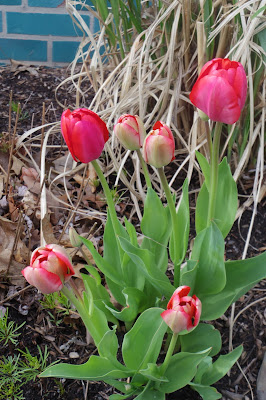Tulips are a native plant of Turkey and central Asia. In 1554, Ogier de Busbecq, ambassador of Ferdinand I, Holy Roman Emperor, to the Sultan of Turkey, sent tulip bulbs from the Ottoman Empire to Vienna. Tulip bulbs were distributed to cities in what is now Austria, Belgium, and the Netherlands. By 1593, tulips were planted in earnest in the Netherlands. A Flemish botanist, Carolus Clusius, who was working at the University of Leiden, planted a large collection of tulip bulbs, and he discovered that tulips grew well in the Low Countries.
Tulips became very popular in the Netherlands. In fact, in the seventeenth century, there was a "tulipmania." The price of tulips became greatly inflated, and people could spend more money on tulip bulbs than on their houses. Tulips with multicolored streaks were much valued. The variation of colors on tulip petals is the result of a virus. It is a mosaic virus, called the "Tulip Breaking Virus." It literally breaks the petal into more than one color. There are several types of multicolored tulips, some common and some rare. The rarest type is called Bizarden (Bizarres), which featured yellow or white streaks on a red, brown, or purple background.
 |
| seen in the Japanese gardens, on Mirror Lake near the Buffalo History Museum. |
It was a peaceful time. Tulips grew in large gardens and the image of tulips was seen in embroidered clothing, tiles, miniatures, etc.
Tulips no longer cost as much as a house, but they continue to be popular. They are planted in autumn, and are a lovely sign of spring. Everyone loves them, including deer and rabbits, who consider them to be a delicacy. If you have many deer and rabbit visitors to your garden, you might want to consider planting daffodils and hyacinths instead. Deer and rabbits don't like their flavor and will leave them alone.




1 comment:
I know more and more people seem to be planting tulips here than did years ago. I have both tulips and daffodils in my garden. I love both. It wouldn't be spring without them.
Post a Comment